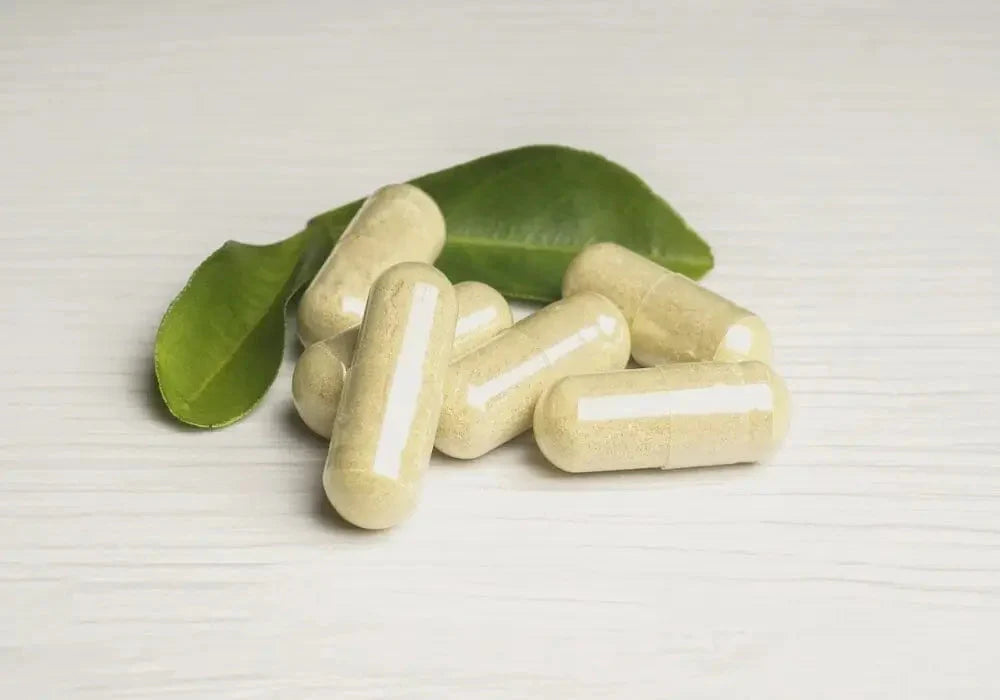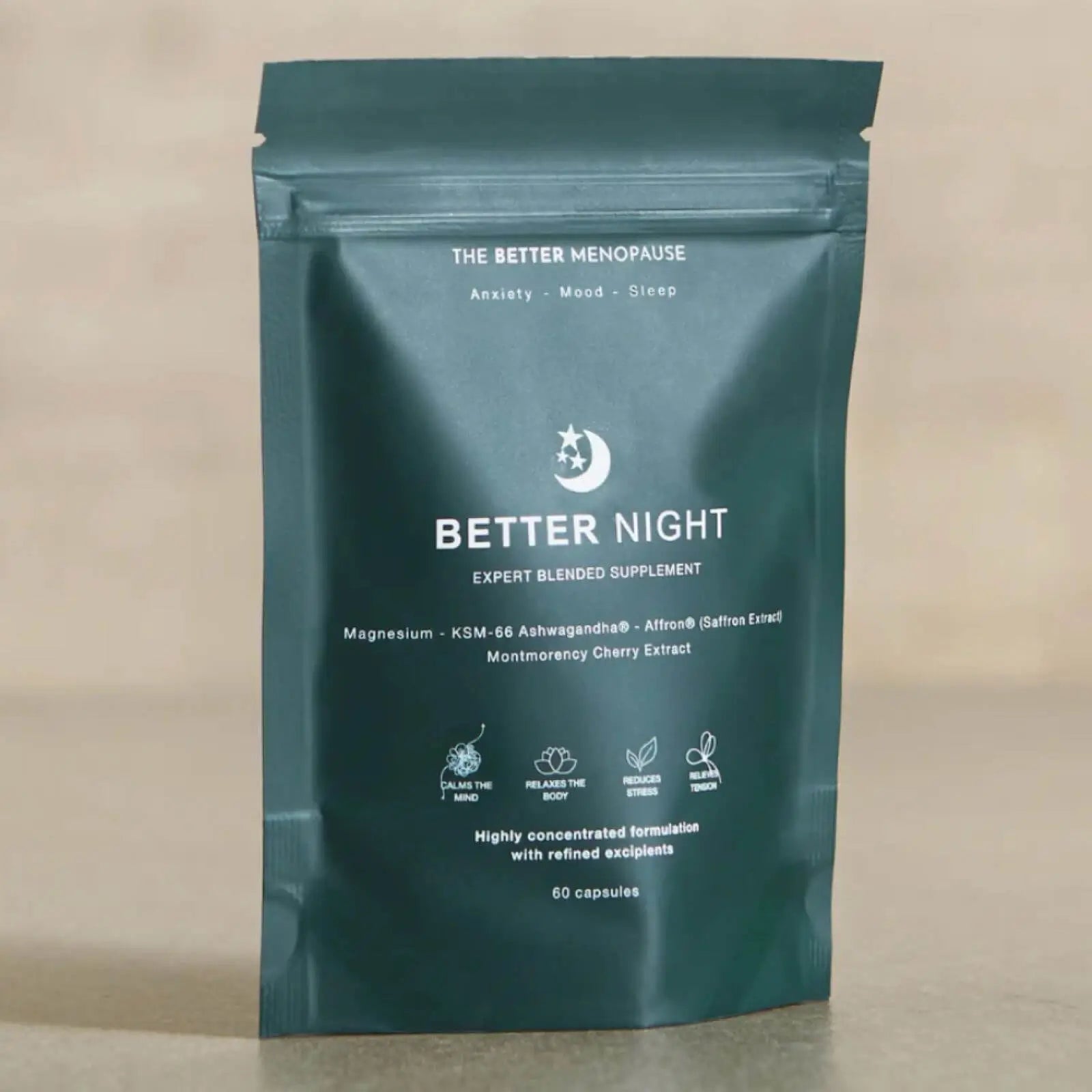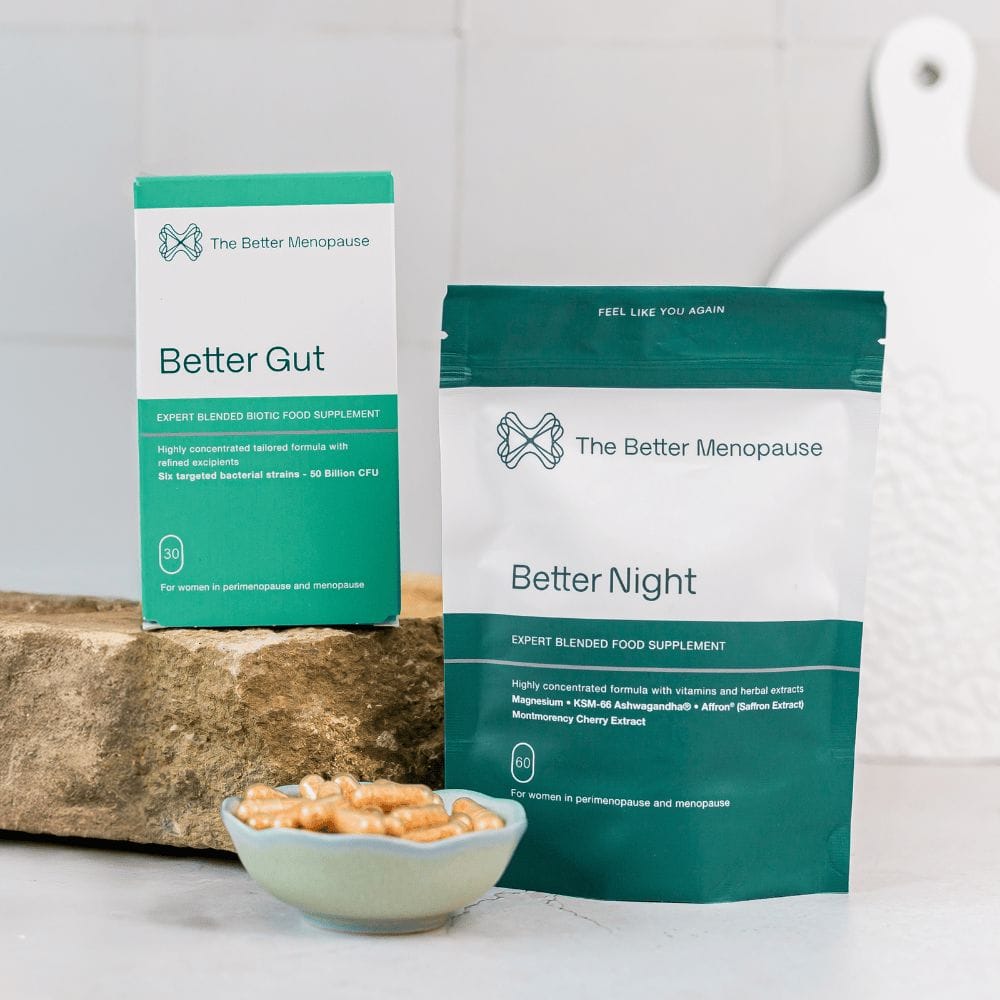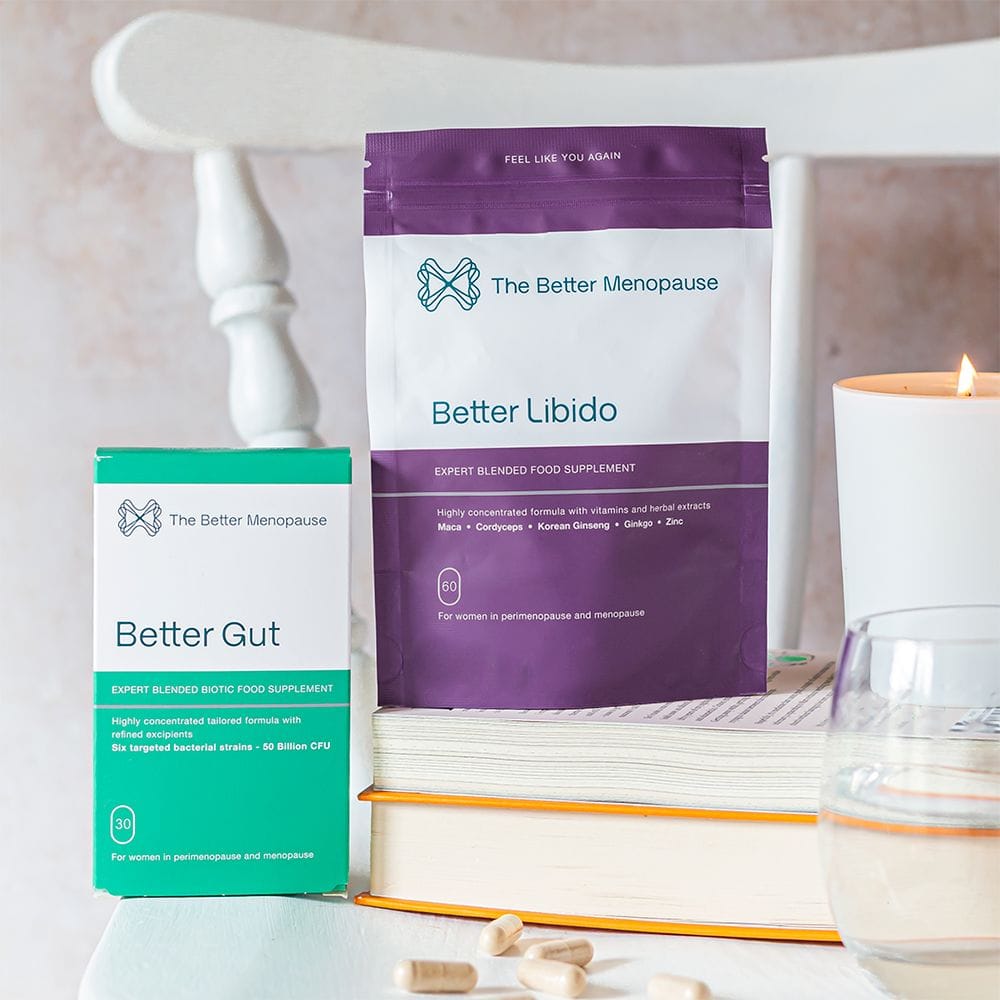
The best probiotic supplements to help with menopause symptoms
The best science-backed probiotics for perimenopause and menopause symptoms including hot flashes, brain fog, anxiety and maintaining a healthy weight.
If you’re experiencing unwanted menopause symptoms, the right probiotic supplement could really help. Probiotics are friendly bacteria that can provide health benefits when you consume them.
Below, we’ll look at six of the best strains of probiotics to help tackle perimenopause and menopause symptoms including hot flushes, brain fog, weight changes, mood swings and anxiety, as well as improving vaginal health, gut health and sleep quality, and reducing the risk of osteoporosis.
These probiotic strains can all survive the journey to your gut, work well together and, most importantly, have scientific studies to back them up.
We’ll also explain how probiotics work, how eating fermented foods containing natural probiotics can help support supplements, and where plant substances called prebiotics come in.
You can find all six of the probiotic strains we discuss in this article in The Better Gut probiotic supplements.
If you want to see what they can do for you, use the discount code WELCOME10 for 10% off your first order.
What to look for in a probiotic supplement
Before choosing the best probiotic supplement for your menopause symptoms, there are several important things to consider:
- Can they make it to your gut alive? The strong acid in your stomach means some probiotic bacteria can’t survive the journey to your gut. It’s therefore important to choose a supplement that contains bacteria with high acidity resistance, such as certain strains of Lactobacilli and Bifidobacteria.
- Is there science to support the claims? When deciding on a probiotic supplement, be clear about what you want it to do. If you’re looking for relief from specific perimenopause or menopause symptoms, make sure there are good scientific studies that have shown the probiotics’ can help with these.
- Is the dose right? The strength of probiotics is measured in colony forming units (CFUs). Commercial probiotic supplements tend to contain between 10 billion and 50 billion CFUs. Choose a product with too few CFUs and you may not get the benefits you’re looking for.
The probiotic strains in The Better Gut have all been shown to reach your gut alive, with the potential to establish themselves there. Importantly when it comes to menopause symptoms, these strains also thrive in your reproductive tract, where they can help to support vaginal health.
Each strain is backed by a number of randomised control trials (RCTs) – the gold standard of scientific studies – demonstrating its benefits for different perimenopause and menopause symptoms. The strains also act symbiotically, meaning they work more powerfully together.
The six probiotic strains in The Better Gut total 50 billion CFUs per capsule, so they have the best chance of being effective without overwhelming your gut.
6 of the best probiotics for menopause symptoms
Here we’ll look at six specific strains of probiotic bacteria that have been shown in scientific studies to help with women’s health, including a variety of perimenopause and menopause symptoms.
The names of probiotic bacteria consist of their genus, such as Lactobacillus, followed by their species, for example Rhamnosus, and then in some cases a series of letters and/or numbers that refer to the specific strain of bacteria.
When it comes to probiotic supplements, it’s important to be aware that two different strains of bacteria from the same species may not have the same effects.
The evidence behind these strains, and the fact that they complement each other so well, is what led us to choose them for The Better Gut probiotic supplements.
1. Lactobacillus rhamnosus GG
Lactobacillus rhamnosus GG is a lactic acid bacteria (LAB) known for improving digestive issues, including IBS, and protecting the lining of your gut.
When it comes to perimenopause and menopause symptoms, Lactobacillus rhamnosus GG can also help to:
- reduce the frequency and severity of hot flushes and night sweats
- improve bone density and reduce the risk of osteoporosis
- reduce vaginal dryness and inflammation
- reduce the risk of anxiety and depression
- improve gut wall permeability
2. HOWARU® Lactobacillus rhamnosus HN001
Also known by its more recent genus classification Lacticaseibacillus, HOWARU® Lactobacillus rhamnosus HN001 has been trialled in studies involving women both during perimenopause and after menopause.
It may help to:
- improve mood swings
- treat IBS
- reduce the frequency and severity of hot flushes and night sweats
- support the immune system by promoting the growth of healthy gut bacteria
- reduce vaginal dryness and inflammation
- reduce risk of osteoporosis
3. Lactobacillus acidophilus La-14
Lactobacillus acidophilus La-14 is another LAB. It has been shown to speed up your immune system’s response to infection and works particularly well in women’s health when combined with Lactobacillus rhamnosus HN001.
Lactobacillus acidophilus La-14 can help to:
- support the immune system by promoting the growth of healthy gut bacteria
- reduce inflammation and bloating
- prevent vaginal and urinary tract infections
4. Bifidobacterium animalis subsp lactis
Strains of Bifidobacterium lactis – also known as Bifidobacterium animalis lactis – can strengthen your gut barrier, improve digestive issues and increase your resistance to respiratory infections.
When it comes to perimenopause and menopause symptoms Bifidobacterium lactis can help to:
- reduce hot flushes and night sweats
- improve vaginal health
- treat IBS and constipation
- reduce risk of osteoporosis
- boost mood
- improve sleep quality
- reduce symptoms of anxiety and depression
5. Lactobacillus Reuteri 1E1
Strains of Lactobacillus Reuteri have antimicrobial and immune-boosting properties, and can improve the balance of your gut microbiome and strengthen your gut barrier.
Lactobacillus Reuteri 1E1 can also help with specific perimenopause and menopause symptoms, including:
- hot flushes and night sweats
- vaginal infections
- urinary tract infections
- mood swings
- poor sleep quality
- osteoporosis risk
6. Bifidobacterium bifidum BB-06
Bifidobacterium bifidum BB-06 is involved in lowering cholesterol and supporting heart health. It can also help tackle perimenopause and menopause symptoms by:
- reducing the severity and frequency of hot flushes and night sweats
- improving gut health by reducing inflammation and improving bowel regularity
- improving vaginal health
- lowering the risk of osteoporosis
- boosting the immune system
Find out more about a probiotic supplement that contains all six of these strains in one capsule. And get 10% off your first order here.
How do probiotics work?
Probiotic bacteria are similar to – and in many cases, the same as – the “good” bacteria that live in your gut. In fact, if you consume the right probiotics on a regular basis, they may become part of the community of microorganisms that make up your gut microbiome.
Probiotics can help your body to produce vitamins, absorb minerals and break down difficult to digest substances like lactose.
They also turn the plant foods you eat into substances called short-chain fatty acids (SCFAs), which have numerous health benefits including lowering chronic inflammation and regulating your immune system.
Adding more friendly bacteria to your gut can improve the balance of your gut microbiome too, reducing the amount of unhealthy microbes.
Even if the probiotics you consume don’t hang around in your gut forever, they can still perform these important functions on their way through.
Probiotic foods
Supplements aren’t the only source of probiotics – these beneficial microorganisms are also found naturally in live fermented foods and drinks, including:
- yoghurt
- kefir
- aged cheeses
- miso
- kombucha
- sauerkraut
- kimchi
- other fermented vegetables
While the probiotics in fermented foods won’t target particular menopause symptoms in the way that a specially designed probiotic supplement like The Better Gut does, they may help to support the bacteria it contains, as well as improving your gut health and overall health.
To give these friendly bacteria the best chance to have an impact, try to include as wide a variety of fermented foods as possible in your diet and to eat some every day. This will increase the range of bacteria you consume and give them a better chance of thriving in your gut.
Probiotics and prebiotics
Prebiotics are special types of fibres and sugars found in plant foods. They act as fuel for the friendly microbes in your gut, which turn them into substances like vitamins and short-chain fatty acids that have beneficial effects around your body.
If you’re taking a probiotic supplement, or eating fermented foods, you may be able to boost their impact, and give them a better chance of remaining in your gut for longer, by including plenty of prebiotics in your diet.
Because different plants contain different prebiotics, and different prebiotics feed different types of bacteria, the wider range of plants you eat the better.
A few examples of the many plants that are good sources of prebiotics include:
- artichokes
- asparagus
- berries
- chicory
- tomatoes
- garlic
- onions
- beans and pulses
- leafy green vegetables
- wholegrains, such as oats and barley
- nuts, including almonds
- seeds, like chia and flaxseeds
Summary
The right probiotic supplements can help to ease a range of perimenopause and menopause symptoms. Regularly eating fermented foods, and plants containing prebiotics, can support this.
Look for probiotic supplements with strains that can reach your gut alive, work well together and have research to support the claims they make.
Some of the best probiotic bacteria for menopause include strains of Lactobacillus rhamnosus, Lactobacillus acidophilus, Bifidobacterium lactis, Lactobacillus reuteri and Bifidobacterium bifidum.
Together they can boost your immune system and gut health, and improve hot flashes, brain fog, mood swings, anxiety, sleep quality, vaginal health and osteoporosis risk.
You can find all of these probiotic strains in The Better Gut supplements. Learn more here – and get 10% off your first order with the discount code WELCOME10.
Sources
Research supporting Lactobacillus rhamnosus HN001
Effects of Lactobacillus rhamnosus and Lactobacillus acidophilus on bacterial vaginal pathogens. International Journal of Immunopharmacology. (2017). https://www.ncbi.nlm.nih.gov/pmc/articles/PMC5806794/
Effect of Lactobacillus rhamnosus HN001 in pregnancy on postpartum symptoms of depression and anxiety: a randomised double-blind placebo-controlled trial. British Journal of Nutrition. (2018). https://www.sciencedirect.com/science/article/pii/S2352396417303663
Effects of probiotics on vaginal health in women undergoing menopause: a randomized controlled trial. Nutrients. (2018).
Effects of Lactobacillus rhamnosus HN001 on bone mineral density and bone turnover markers in postmenopausal women: a double-blind, placebo-controlled trial. Menopause. (2015).
Evidence-based mixture containing Lactobacillus strains and lactoferrin to prevent recurrent bacterial vaginosis: a double blind, placebo controlled, randomised clinical trial. BMC Women’s Health. (2018). https://www.wageningenacademic.com/doi/abs/10.3920/BM2018.0075
Growth and adhesion to HT-29 cells inhibition of Gram-negatives by Bifidobacterium longum BB536 and Lactobacillus rhamnosus HN001 alone and in combination. European Review for Medical and Pharmacological Science. (2016). https://pubmed.ncbi.nlm.nih.gov/27981539/
Lactobacilli vaginal colonisation after oral consumption of Respecta(®) complex: a randomised controlled pilot study. Archives of Gynecology and Obstetrics. (2015). https://pubmed.ncbi.nlm.nih.gov/25855055/
Lactobacillus by-products inhibit the growth and virulence of uropathogenic Escherichia coli. Journal of Antimicrobial Chemotherapy. (2009). https://pubmed.ncbi.nlm.nih.gov/20224146/
Study on the effects of an oral lactobacilli and lactoferrin complex in women with intermediate vaginal microbiota. Archives of Gynecology and Obstetrics. (2018). https://pubmed.ncbi.nlm.nih.gov/29637269/
Research supporting Lactobacillus rhamnosus GG
Effect of Lactobacillus rhamnosus GG on vasomotor symptoms in menopausal women: a randomised, double-blind, placebo-controlled trial. Menopause. (2012).
Lactobacillus rhamnosus GG (LGG) enhances vaginal microbiota diversity and reduces vaginal inflammation in healthy women: a double-blind, randomised, placebo-controlled trial. Microbes and Infection. (2008).
Lactobacillus rhamnosus GG improves mood in menopausal women: a randomised, double-blind, placebo-controlled trial. Menopause. (2012).
Lactobacillus rhamnosus GG improves quality of life in menopausal women: a randomised, double-blind, placebo-controlled trial. Climacteric. (2017).
Lactobacillus rhamnosus GG improves sleep quality in menopausal women: a randomised, double-blind, placebo-controlled trial. Menopause. (2016).
Lactobacillus rhamnosus GG improves vaginal health in menopausal women with recurrent vulvovaginal candidiasis: a randomised, double-blind, placebo-controlled trial. Climacteric. (2014).
Lactobacillus rhamnosus GG supplementation improves bone mineral density and bone turnover markers in postmenopausal women: a double-blind, randomised, placebo-controlled trial. Menopause. (2010).
Research supporting Lactobacillus acidophilus La-14
Effects of Lactobacillus acidophilus La-14 on vaginal health in women undergoing menopause: a randomised controlled trial. Nutrients. (2022).
Lactobacillus acidophilus La-14 enhances the diversity of gut microbiota in healthy adults: a randomised, double-blind, placebo-controlled trial. Gut Microbes. (2020).
Lactobacillus acidophilus La-14 reduces the risk of vaginal and urinary tract infections in postmenopausal women: a randomised controlled trial. Menopause. (2015).
Lactobacillus acidophilus La-14 supplementation enhances the immune response in healthy elderly women: a double-blind, randomised controlled trial. Frontiers in Immunology. (2019).
Lactobacillus acidophilus La-14 supplementation improves bone mineral density and bone turnover markers in healthy elderly women: a double-blind, randomised controlled trial. Nutrients. (2005).
Research supporting Bifidobacterium lactis
Bifidobacterium lactis GG enhances vaginal microbiota diversity and reduces vaginal inflammation in healthy women: a double-blind, randomised, placebo-controlled trial. Microbes and Infection. (2008).
Bifidobacterium lactis GG improves hot flashes and night sweats in menopausal women: a randomised, double-blind, placebo-controlled trial. Menopause. (2012).
Bifidobacterium lactis supplementation improves bone mineral density and bone turnover markers in postmenopausal women: a double-blind, randomised, placebo-controlled trial. Menopause. (2010).
Effect of Bifidobacterium lactis CECT 5713 on mood and sleep quality in postmenopausal women: a double-blind, randomised, placebo-controlled trial. Climacteric. (2017).
Effect of Bifidobacterium lactis HN019 on anxiety and depression in adults: a randomised, double-blind, placebo-controlled trial. Journal of Clinical Psychiatry. (2015).
Research supporting Lactobacillus reuteri 1E1
A combination of probiotics improves vaginal health and reduces the risk of urinary tract infections in women: a randomised, double-blind, placebo-controlled trial. Nature Microbiology. (2022).
Effect of Lactobacillus reuteri 1E1 on mood and sleep quality in postmenopausal women: a double-blind, randomised, placebo-controlled trial. Climacteric.
(2017).
Lactobacillus reuteri 1E1 alleviates vaginal dryness and inflammation in menopausal women: a double-blind, randomised, placebo-controlled trial. Menopause. (2013).
Lactobacillus reuteri intake decreases lipid accumulation and promotes glucose metabolism in women with menopausal syndrome. Nutrients. (2020).
Lactobacillus reuteri vaginal capsules in the treatment of menopausal hot flushes: a double-blind, randomised, placebo-controlled trial. Menopause. (2005).
Research supporting Bifidobacterium bifidum BB-06
Bifidobacterium bifidum BB-06 enhances bone mineral density in menopausal women: a randomised, double-blind, placebo-controlled trial. Menopause. (2010).
Bifidobacterium bifidum BB-06 improves vaginal health in menopausal women: a randomised, double-blind, placebo-controlled trial. Climacteric. (2017).
Effect of Bifidobacterium bifidum BB-06 on immune function in healthy adults: a randomised, double-blind, placebo-controlled trial. Nutrition Journal. (2012).
Effect of Bifidobacterium bifidum BB-06 on menopausal symptoms: a randomised, double-blind, placebo-controlled trial. Menopause. (2013).
Randomised clinical trial: Bifidobacterium bifidum MIMBb75 significantly alleviates irritable bowel syndrome and improves quality of life — a double-blind, placebo-controlled study. Alimentary Pharmacology & Therapeutics. (2011). https://pubmed.ncbi.nlm.nih.gov/21418261/
Other sources
Bifidobacterium bifidum – BB06 (MB 107). Microbiome Hub. https://microbiome-hub.com/probiotic-strains/bifidobacterium-bifidum-bb06-mb-107/
Effects of probiotics on gut microbiota: mechanisms of intestinal immunomodulation and neuromodulation. Therapeutic Advances in Gastroenterology. (2013). https://www.ncbi.nlm.nih.gov/pmc/articles/PMC3539293/
Effects of seven potential probiotic strains on specific immune responses in healthy adults: a double-blind, randomized, controlled trial. FEMS Immunology and Medical Microbiology. (2008). https://pubmed.ncbi.nlm.nih.gov/18422632/
Fermented foods, health and the gut microbiome. Nutrients. (2022). https://www.mdpi.com/2072-6643/14/7/1527
Fiber and prebiotics: mechanisms and health benefits. Nutrients. (2013). https://www.ncbi.nlm.nih.gov/pmc/articles/PMC3705355/
Health benefits and side effects of short-chain fatty acids. Foods. (2022). https://www.ncbi.nlm.nih.gov/pmc/articles/PMC9498509/
Lactobacillus acidophilus La-14. HOWARU. https://hcp.howaru.com/strains/la-14/
Microbiota in the stomach and application of probiotics to gastroduodenal diseases. World Journal of Gastroenterology. (2022). https://www.ncbi.nlm.nih.gov/pmc/articles/PMC9813937/
Plant prebiotics and their role in the amelioration of diseases. Biomolecules. (2021). https://www.ncbi.nlm.nih.gov/pmc/articles/PMC8002343/
Prebiotics & probiotics. Guts UK. https://gutscharity.org.uk/advice-and-information/health-and-lifestyle/prebiotics-probiotics/
Probiotics: what you need to know. National Center for Complementary and Integrative Health. (2019). https://www.nccih.nih.gov/health/probiotics-what-you-need-to-know
Role of gut microbiota, probiotics and prebiotics in the cardiovascular diseases. Molecules. (2021). https://www.ncbi.nlm.nih.gov/pmc/articles/PMC7926819/
Role of Lactobacillus reuteri in human health and diseases. Frontiers in Microbiology. (2018). https://www.ncbi.nlm.nih.gov/pmc/articles/PMC5917019/
The science behind the probiotic strain Bifidobacterium animalis subsp. lactis BB-12. Microorganisms. (2014). https://www.ncbi.nlm.nih.gov/pmc/articles/PMC5029483/
Thirty Years of Lactobacillus rhamnosus GG: a review. Journal of Clinical Gastroenterology. (2019). https://pubmed.ncbi.nlm.nih.gov/30741841/





